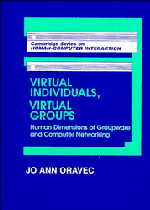Book contents
- Frontmatter
- Contents
- Dedication
- Overview
- Introduction
- 1 Evolution of computer application genres: Groupware and other network-based system applications
- 2 On the infinite variety of virtual entities
- 3 The shape of groups to come: Efforts to define, label, explain, and model collaborative activity
- 4 Shared resources and spaces: Lessons from the use of desks, tables, whiteboards, office settings, and video
- 5 Cultural objects and technological dreams: Dependence, autonomy, and intellectual augmentation
- 6 Privacy, anonymity, and agency: Applications of computer networking and the development of social analogues
- 7 Toward a genre-responsive design approach for computing applications
- Bibliography
- Author index
- Subject index
5 - Cultural objects and technological dreams: Dependence, autonomy, and intellectual augmentation
Published online by Cambridge University Press: 05 August 2011
- Frontmatter
- Contents
- Dedication
- Overview
- Introduction
- 1 Evolution of computer application genres: Groupware and other network-based system applications
- 2 On the infinite variety of virtual entities
- 3 The shape of groups to come: Efforts to define, label, explain, and model collaborative activity
- 4 Shared resources and spaces: Lessons from the use of desks, tables, whiteboards, office settings, and video
- 5 Cultural objects and technological dreams: Dependence, autonomy, and intellectual augmentation
- 6 Privacy, anonymity, and agency: Applications of computer networking and the development of social analogues
- 7 Toward a genre-responsive design approach for computing applications
- Bibliography
- Author index
- Subject index
Summary
If our computer systems break down, we might find an enormous dependency of which we were not truly aware. We may, by then, have become functionally illiterate – unable to deal with each other except with the aid of mechanisms.
Laurie (1979, p.141)A tool is but the extension of a man's hand, and a machine is but a complex tool. And he that invents a machine augments the power of a man and the well-being of mankind.
Henry Ward Beecher (1813–1887), Proverbs from Plymouth PulpitGenres are associated with various cultural objects, objects that can attract us to the genres, make us suspicious of them, or even avoid their use. Sites for constructing, expressing, and modifying cultural objects include debate, writing, speeches, legal decisions, imagery, and design, as well as CSCW and other network-based system applications. Construction of cultural objects, like that of artifacts and other physical objects, should be considered in light of its reflexive dimensions. The objects serve to shape the cultures, individuals, and genres that are associated with them, and in turn are given shape.
Issues of dependence, autonomy, and intellectual augmentation are critical aspects of construction of the “first-person plural” – which involves the authority to attach the word “we” to a document, product, or decision. This authority is not automatically given by group members, and is often not recognized by parties outside the group. In some situations, establishment of this authority may depend on the ability of group participants and audiences to segregate the group from the “computer-mediated group.”
- Type
- Chapter
- Information
- Virtual Individuals, Virtual GroupsHuman Dimensions of Groupware and Computer Networking, pp. 189 - 222Publisher: Cambridge University PressPrint publication year: 1996



